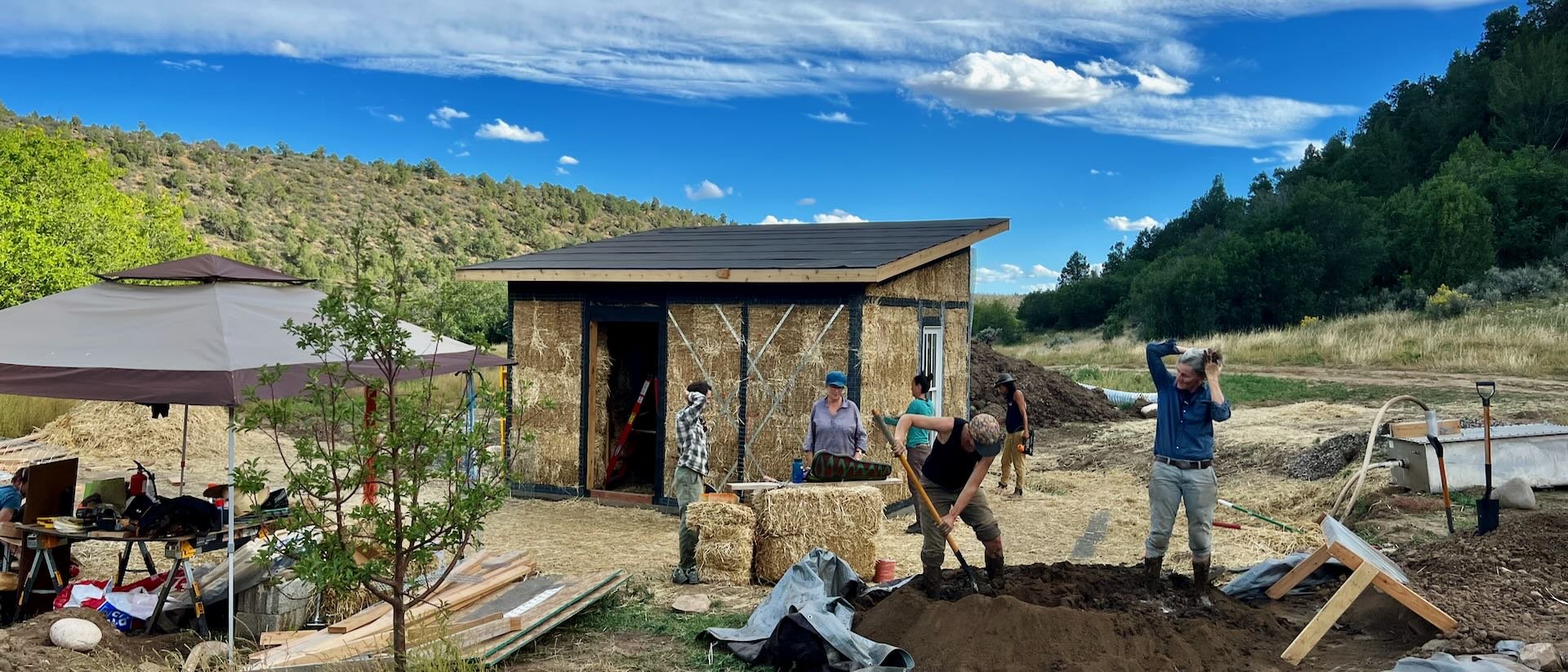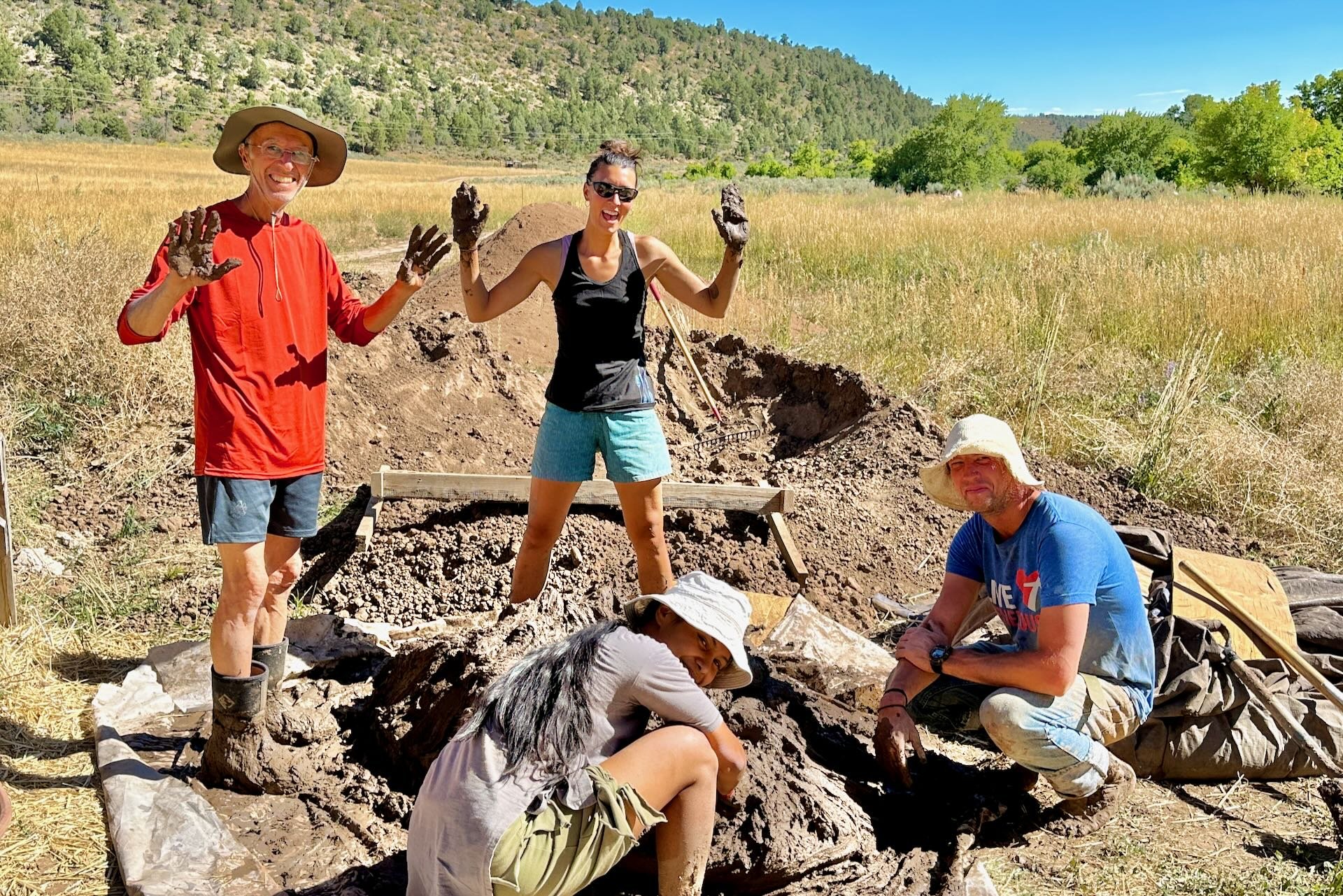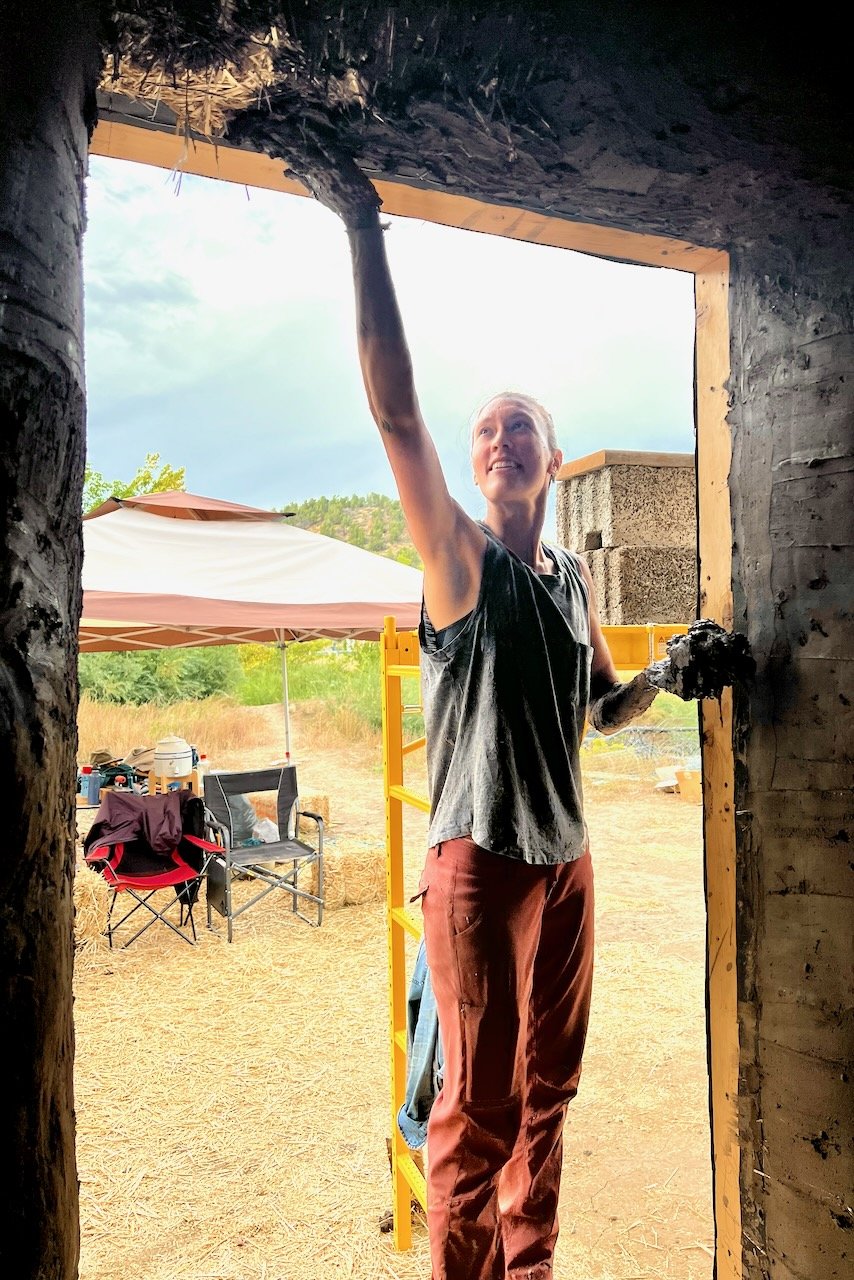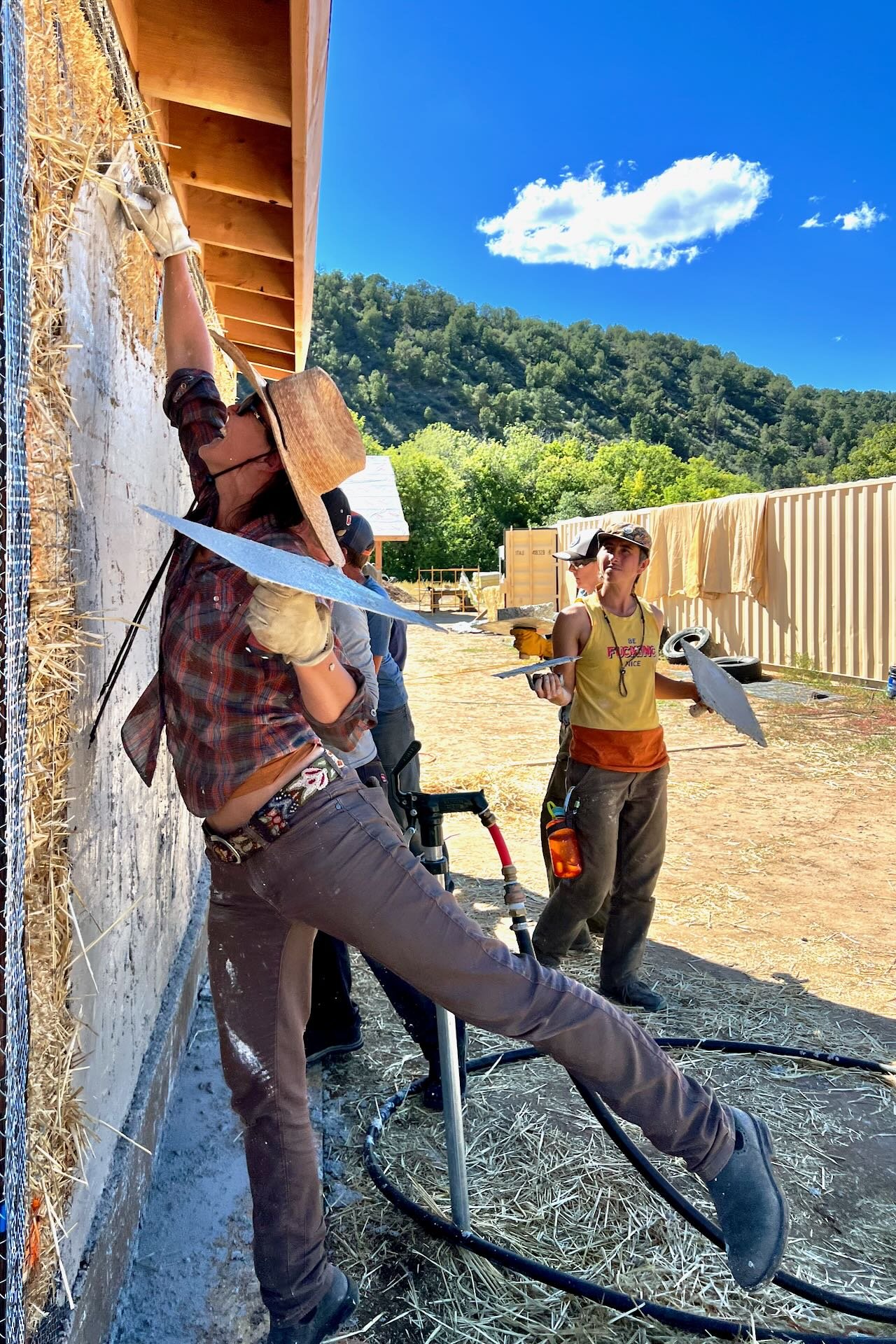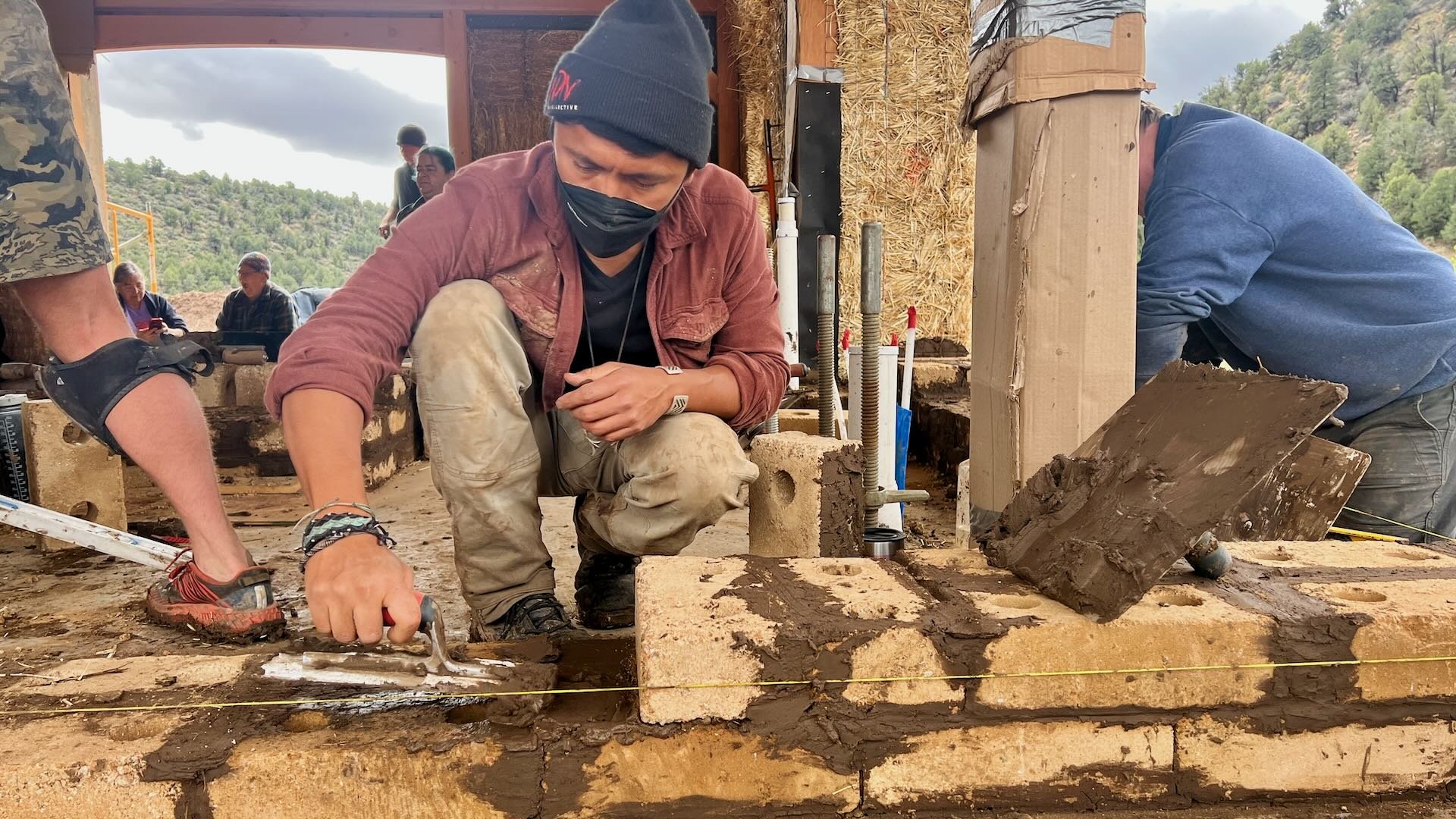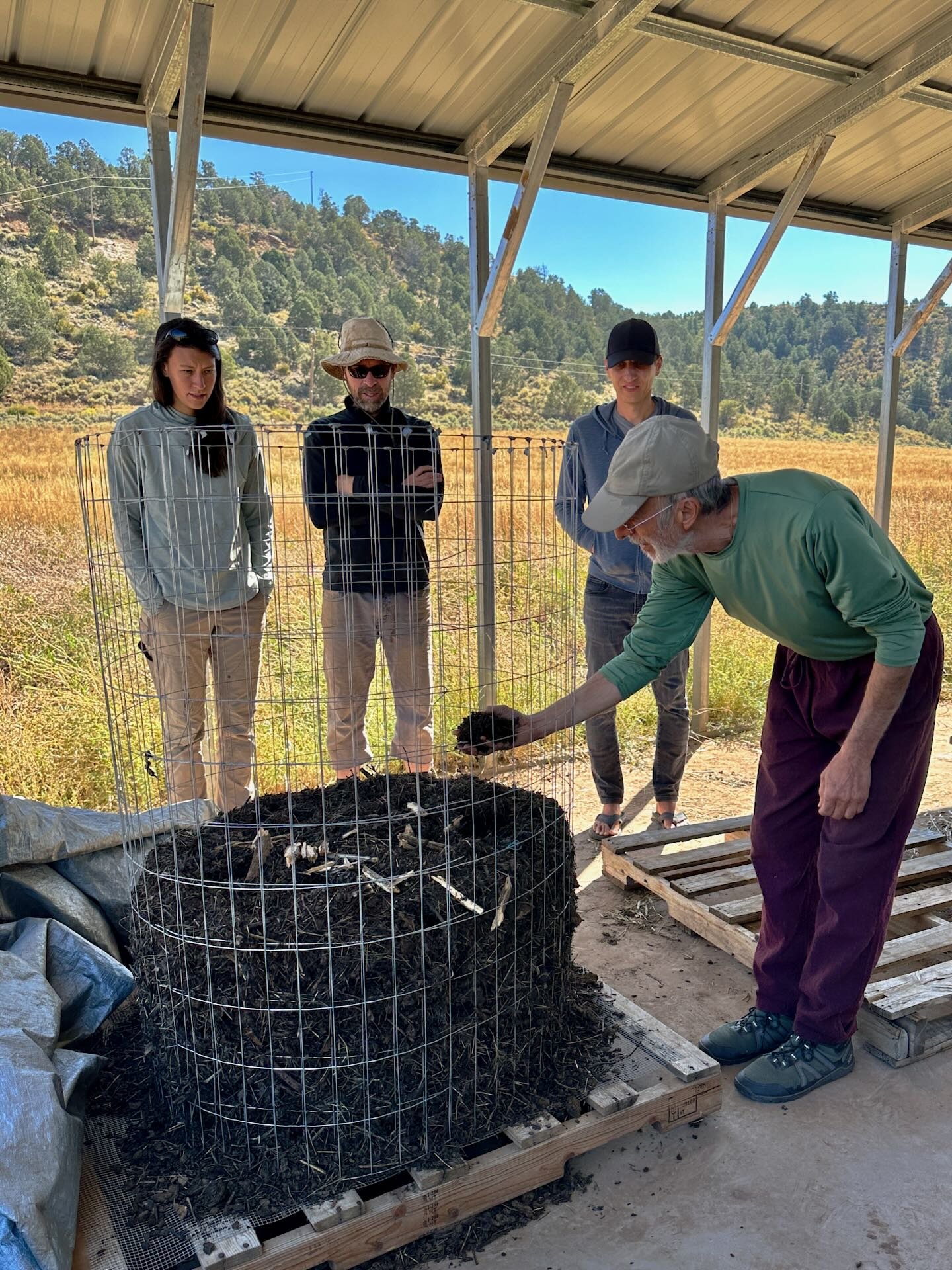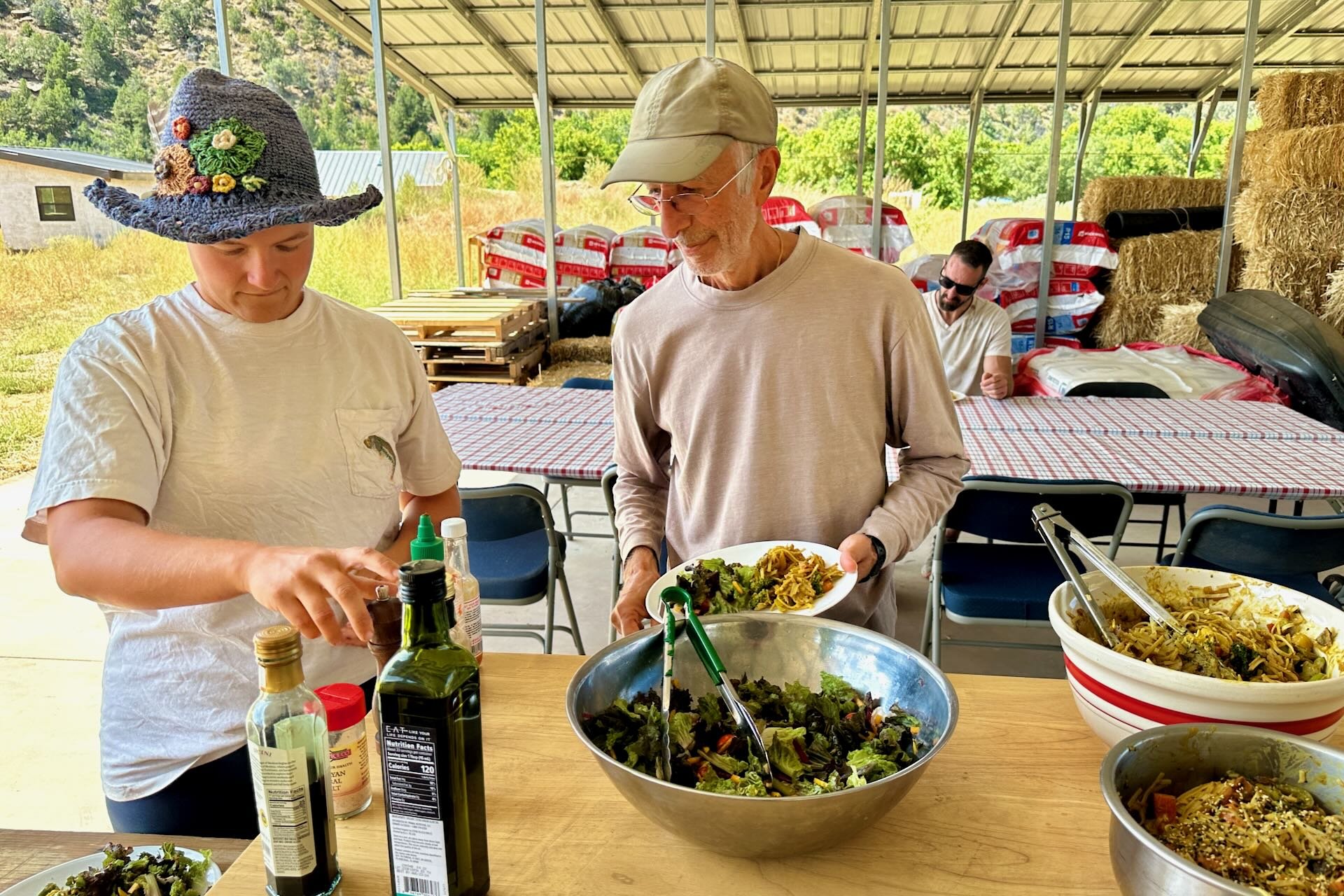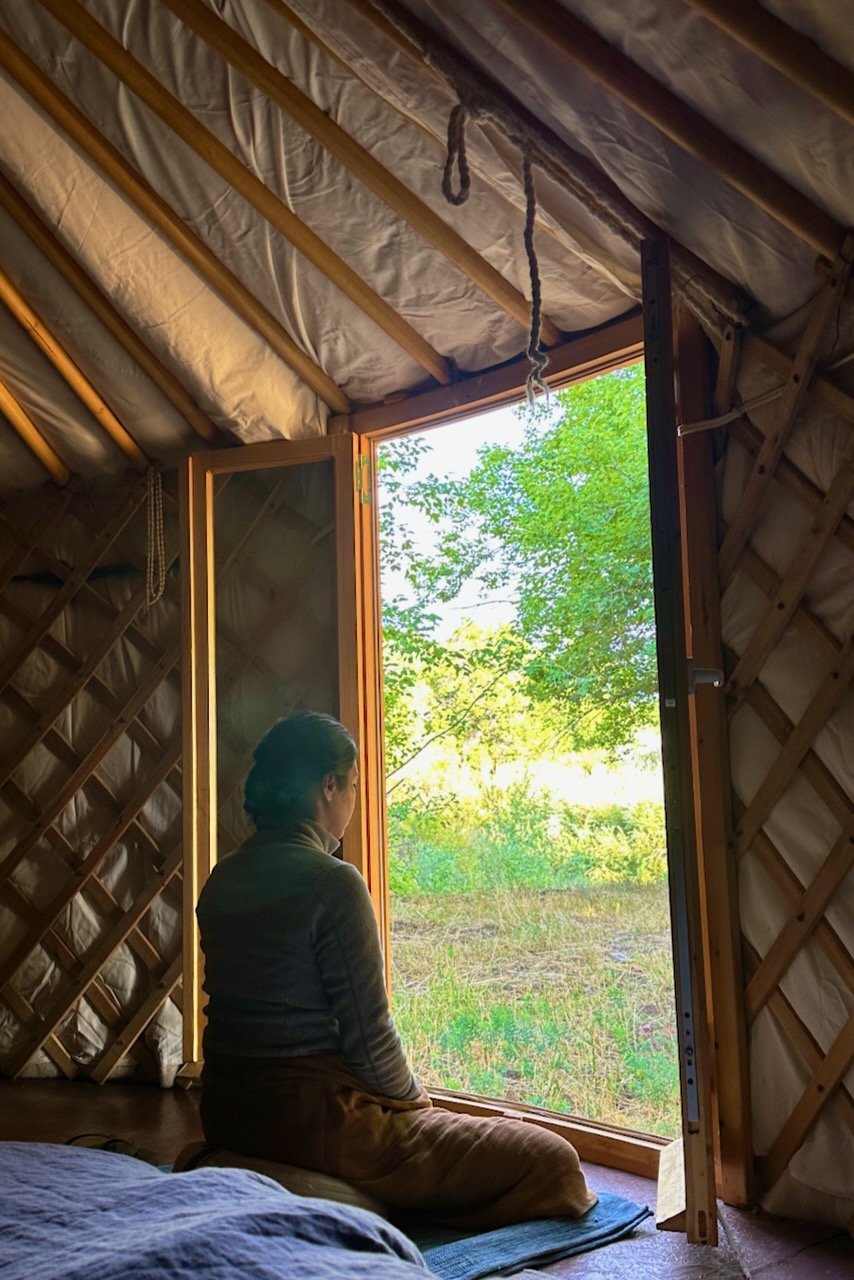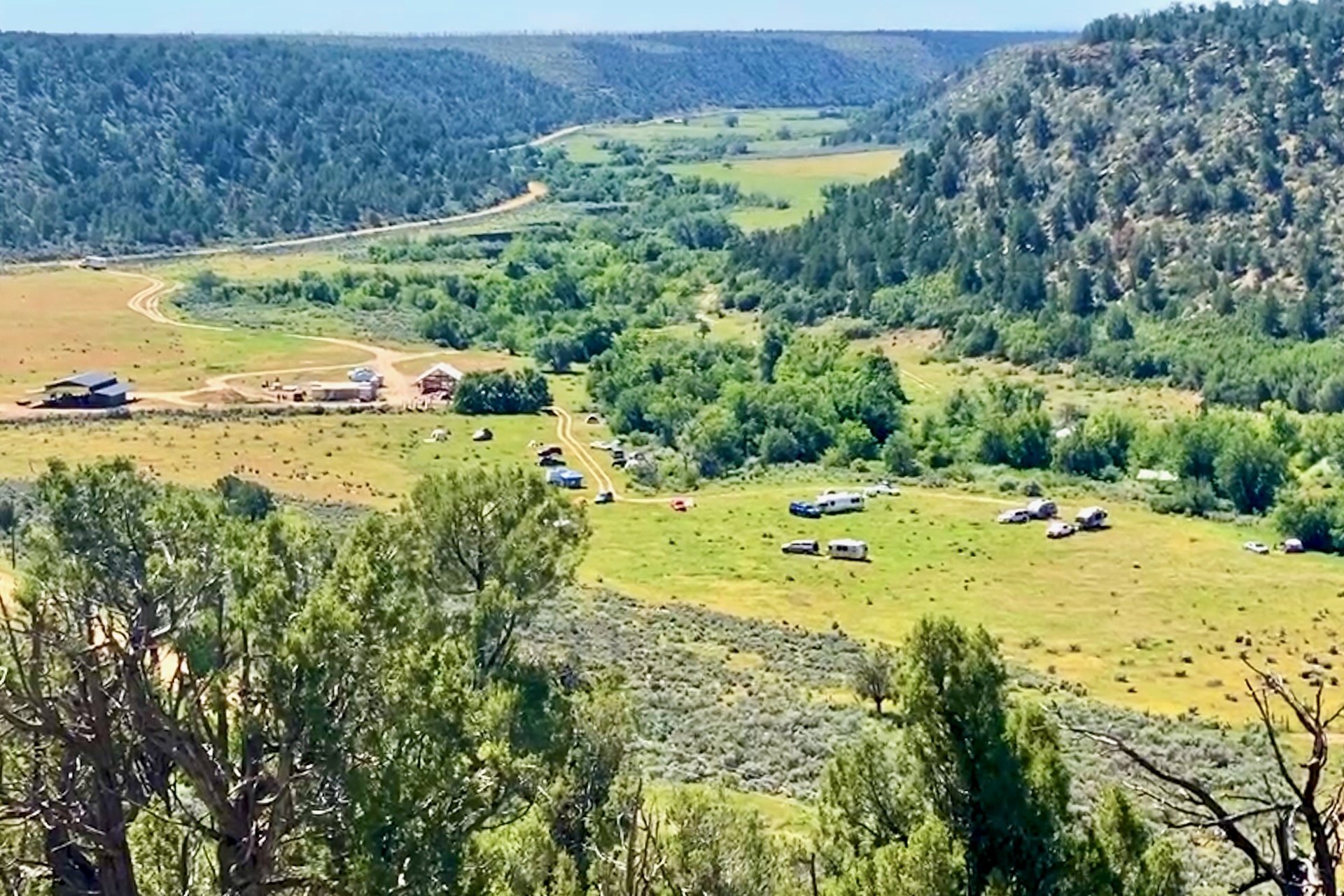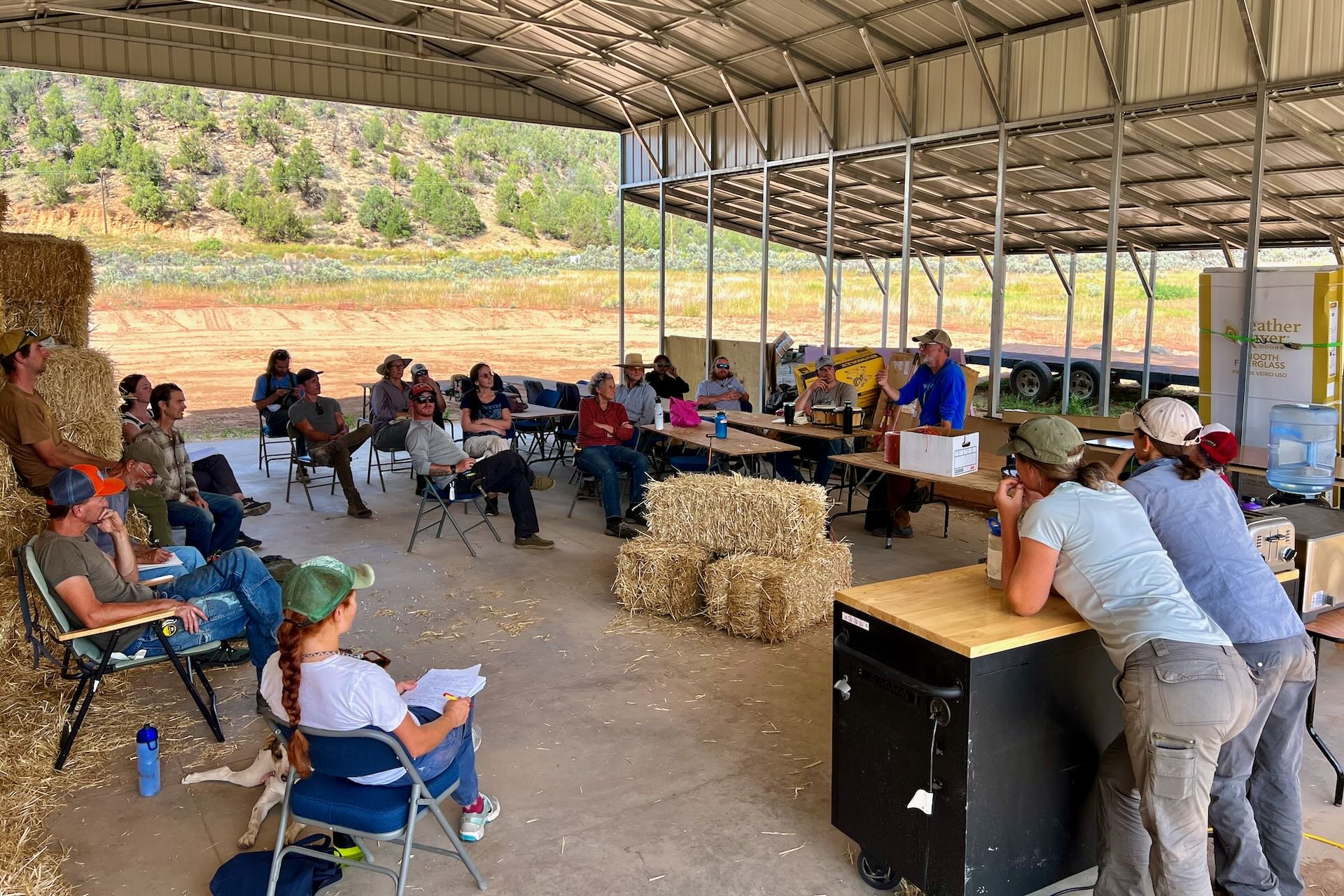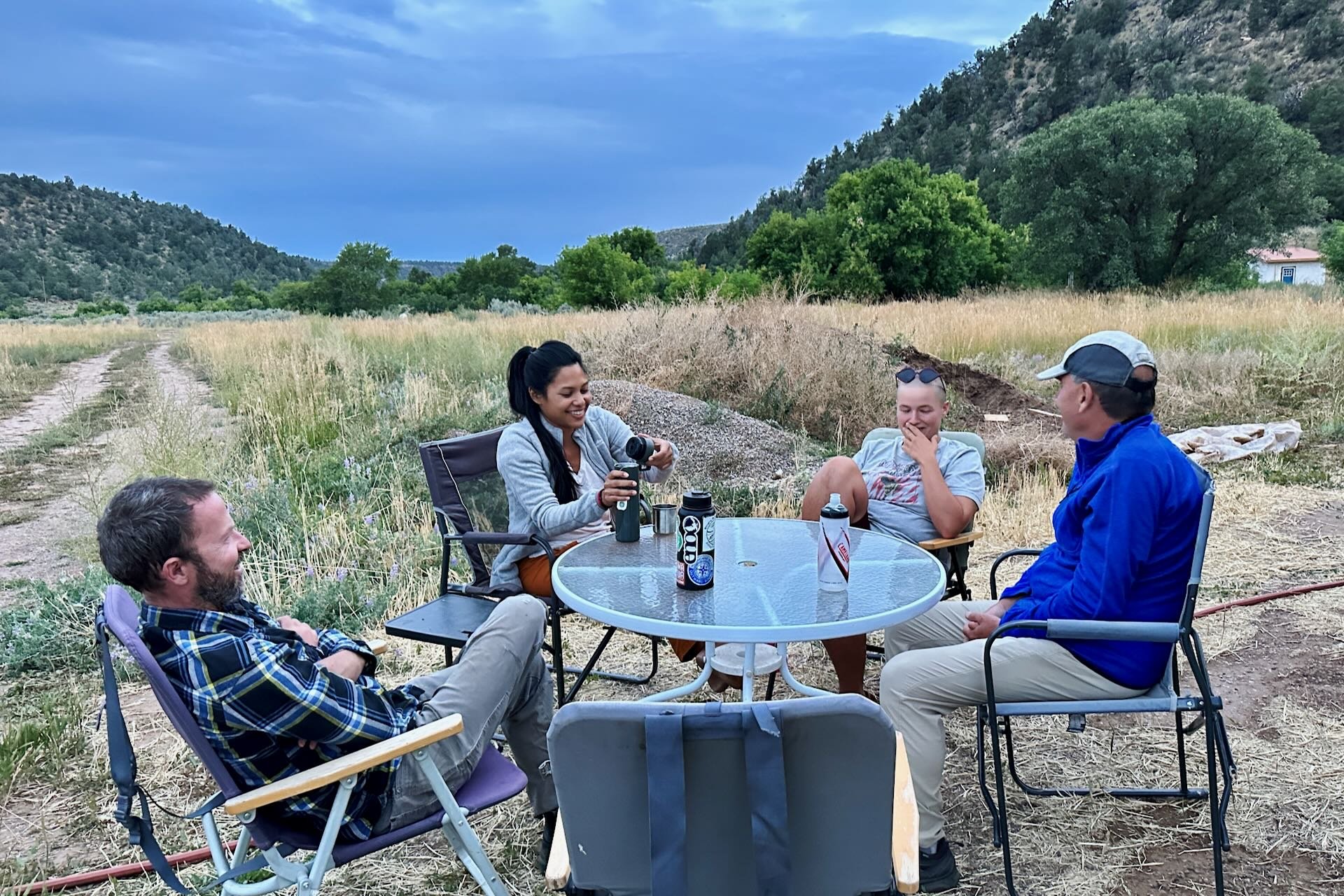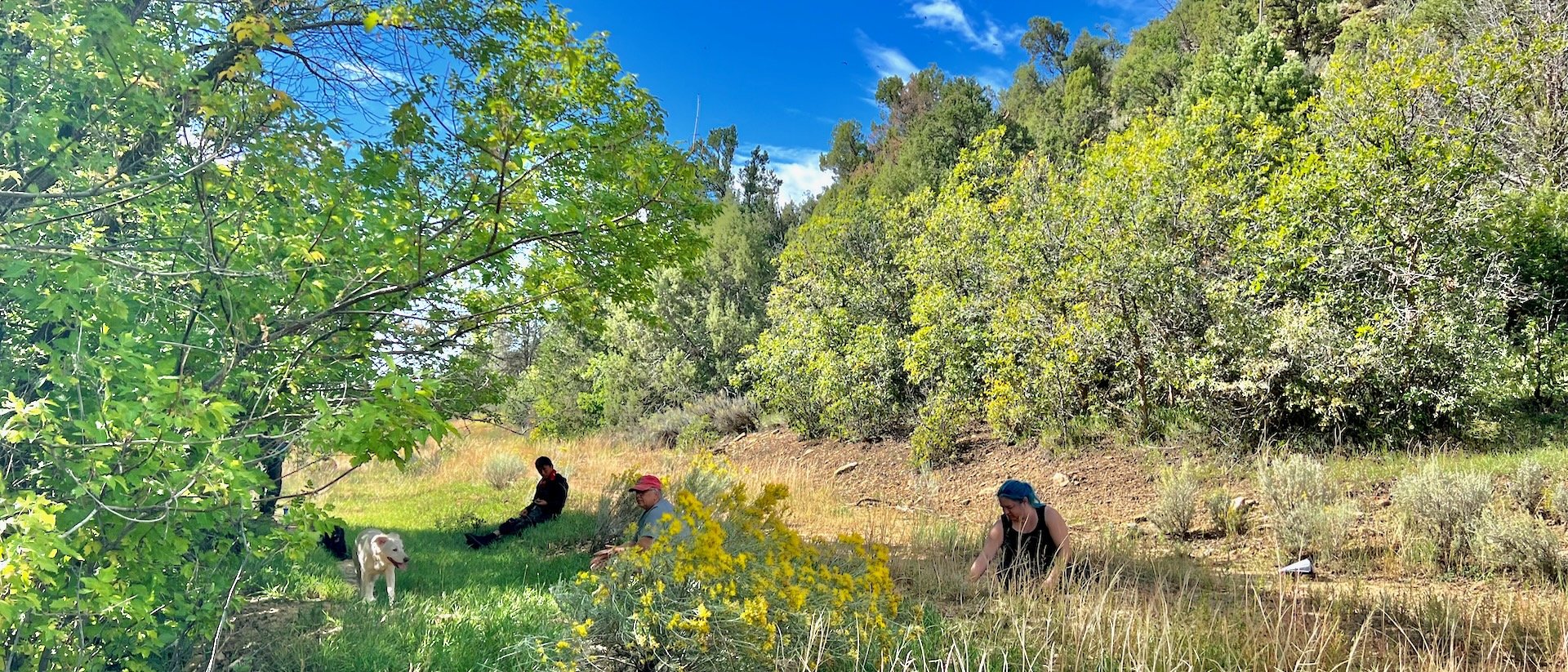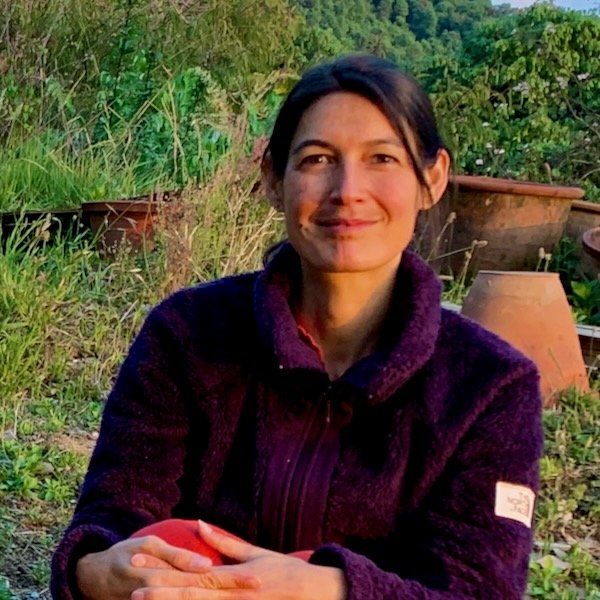SUMMER OF SUSTAINABILITY
Learn it by living it!
Jun 24 – Sep 21, 2024
A three-month immersive residential service-learning program providing an engaging in-depth exploration of sustainable and compassionate living integrating hands-on experience with contemplative practice in a healthy and supportive environment in the lap of nature
Earth-friendly natural building
Organic food-growing
Permaculture principles
Integrated personal and vocational development
Healthy living: meditation, yoga, and more
AT A GLANCE
Location: Earthville Institute, Colorado
Dates: June 24 – September 21, 2024
Program type: Immersive residential service learning (combining elements of internship, workshop, retreat, and more)
Focus: Sustainable and compassionate living, integrating hands-on work with contemplative practice
Instructors & facilitators: Mark Moore, Daphne Charles, Anya Chang-DePuy, James Simmons, et al.
Language: English (translation may be possible)
Building a Better World? Yes, this workshop-retreat qualifies as a module in the Building a Better World program and provides thirteen weeks of credit toward certification in that program.
“One must learn by doing the thing. For, though you think you know it, you have no certainty until you try.”
— Aristotle
A quick taste of Summer of Sustainability
INTRODUCTION
Earthville Institute is pleased to announce its first-ever three-month residential service-learning program: Summer of Sustainability 2024! The SoS will provide an engaging in-depth exploration of sustainable and compassionate living, integrating hands-on experience with contemplative practice in a healthy and supportive environment in the lap of nature.
Key topics of exploration: Compassionate living
This interdisciplinary program explores the art of what we call “compassionate living,” which integrates both “outer sustainability” and “inner sustainability,” seeking ways of living in harmony with nature as an expression of our true inner nature. This is a big topic, obviously, but for simplicity we can identify four interdependent focal areas:
Shelter: natural building, in harmony with nature
Food: organic gardening and permaculture principles
Community life: compassionate communication, collaboration, and co-creation
Inner life: meditation, yoga, and cultivating our best qualities
Each of these is explored in more detail below.
Format & structure: Hybrid service-learning program
Imagine a hands-on sustainability internship and a contemplative meditation/yoga retreat fall madly in love and have a baby… and then imagine that baby growing into an alternative school that nurtures and encourages its creativity, compassion and holistic development… and now imagine that the richly fascinating process of cultivating that sprouting school itself is opened up to a few good-hearted humans as a unique service-learning experience. That’s essentially what’s happening here. Those who join us are helping to create an inspiring educational institute that will transform many lives, and that co-creation experience itself can be life-transforming.
15% training workshop
+ 15% contemplative retreat
+ 50% hands-on service-learning internship
+ 20% whatever magic you make of it
= 100% time well-spent!
The three-month program will alternate between two different modes: workshop/retreat mode and service-learning/internship mode (with a few other flavors thrown in here and there for good measure). The thirteen weeks will include:
Eight weeks total of service-learning/internship mode (typically seven hours per day, four days per week, with the remaining three days mostly free except for a few small tasks, and with all evenings typically free or flexible)
Four weeks total of intensive workshop/retreat mode (full-day schedule including evening sessions, six days per week)
One week of reflection, journaling, and sharing (all day for the whole week, but with a gentle and spacious schedule)
Milestone Modules
The five intensive/contemplative/reflective weeks will be spread across four different shorter programs within the larger program. We call these “Milestone Modules” because they are designed as inflection points in the program, where much rich material will be explored in a focused and structured way. The middle three of these are also being offered to the public as standalone workshops, and one big perk of the Summer of Sustainability 2024 program is that its participants will get to join these workshops and retreats tuition-free in exchange for being a part of help making them happen (which itself will be approached as a service-learning experience).
1. Foundation Week
Six-day practical+conceptual orientation (June 24-29, 2024)
The first week of the program will serve as an orientation to Earthville Institute’s campus and how we do things, and it will lay the foundations for the community culture we will cultivate during our time together for the program: mindful and heartful living, integrating our personal practice with our practical work. We explore ways to fine-tune ourselves as collaborators, communicators, and creators, and as sensitive and effective doers of beautiful things.
Foundation week will be followed by one week of settling in further, continuing to get to know one another, and stepping into the various tasks of daily life in Earthville as we prepare for the retreat we’ll have in week three, below.
2. Spontaneous Creativity: Meditation for Manifestation
Six-day contemplative retreat (July 8-13, 2024)
The third week of the program will be a retreat exploring practices that support us to connect to the source of creativity within us and bring the mindfulness and warm-hearted presence of meditative practice into the work of our daily lives. This retreat will help establish a common ground for our mode of working together for the duration of the program, and the tools it provides are profoundly useful in other areas of life, too. For details on Spontaneous Creativity, see the retreat’s event page.
Spontaneous Creativity retreat will be followed by two weeks in service-learning mode, which will give us opportunities to apply what we learn in the retreat to our work around the campus.
3. Touching Earth Workshop
Two-week hands-on workshop with a contemplative approach (July 22 – August 3, 2024)
For the sixth and seventh weeks of the program, we’ll enjoy a two-week residential workshop exploring natural building techniques and our connection to nature. Will provide opportunities to learn and practice some of the foundational skills of earthen building and contemplate living in harmony with nature. The first week will focus on clay-based materials and techniques, and the second will focus more on lime-based materials and techniques. For details on Touching Earth, see the workshop’s event page.
Touching Earth will be followed by four weeks mostly in service-learning mode, allowing us to deepen our learning by practicing the skills and methods explored in the workshop, while continuing to cultivate our mindful and balanced approach to work.
4. Integration Week
Six-day concluding retreat (mid-September; exact dates TBA)
For a week near the end of the program, we will create a space for reflecting on our learning and experience over the three months, through a combination of journaling, self-evaluation, documenting, and sharing. We’ll then take some time to prepare for transitions and explore ways to keep our new insights and practices alive as we move on to whatever might come next.
MORE ABOUT THE FOUR FOCAL AREAS
Shelter: Natural Building —
Sustainable, Healthy, Affordable & Beautiful Homes
There's a reason that earthen building is enjoying a renaissance around the world: it is simply one of the wisest ways to build. The many benefits of earthen buildings and clay plasters include:
Sustainability (one of the most eco-friendly ways to build)
Human health (no toxic materials, vapor permeability while maintaining insulative qualities)
Better thermal properties (balance of insulation and thermal mass)
Optimal acoustic properties (good sound insulation and natural acoustic profile)
Better fire resistance (compared with many conventional building materials)
Affordability (especially when DIY with the support of friends)
Natural beauty with a wide range of design flexibility
We can help you achieve these benefits in your own building, with an emphasis on best practices and a context-responsive approach that will support you to get the best results possible for your unique needs.
What we’ll be learning
Hands-on learning projects will include:
Applying clay plaster to interior straw-bale walls
Applying lime plaster to exterior straw-bale and mud-brick walls
Making traditional adobe bricks (sun-dried blocks made of clay and a bit of straw)
Masonry: building walls with mud bricks and mud mortar (including best practices, bond patterns, etc.)
Creating optimal mud mixes for all of these applications (plasters, bricks and mortar), including DIY soil testing, harvesting, sieving, pugging (mixing with the feet), preparing, and testing the mixes
Limecrete elements (e.g. flooring, windowsills)
Possible work on other lime-based projects, such as hand-sculpted Moroccan-style tadelakt walls for the kitchen bathroom
Possible work on other projects
The hands-on work will be enriched by discussions, presentations, and other activities to provide greater depth and breadth of knowledge, including discussions of best practices for all of the above activities, and why each of them matters.
A presentation on earth as a building material, including both the science of how earth holds together as a building material, and the art of earthen building as explored through a slideshow discussion of earthen architecture around the world (including our eco-campus in the Himalayas).
An overview of other earthen building materials and techniques, with a look at the pros and cons of each, and how to evaluate the best materials and methods to use in your own unique situation.
Daily morning yoga and meditation practice to ground into our earth body, restore balance and vitality.
Discussions exploring our connection with the Earth, and with nature more generally, and how we cultivate a deeper sense of connectedness with nature in a cultural context that has lost most of that wisdom.
Meditative nature walks on the 640-acre grounds, and other opportunities to observe the earth in the context of the site and discuss what we observe.
Consistent with the contemplative theme of the program, all of the hands-on work will be supported by reflection, journaling, sharing and group discussions, to help everyone get the most out of the experience.
All of the above activities together will provide a well-balanced integration of theory and practice, will empower participants with basic skills and important sensitivities, and will provide a good foundation for further explorations (whether those might be with us or elsewhere).
“Study nature, love nature, stay close to nature. It will never fail you.”
— Frank Lloyd Wright
Food: Organic gardening & permaculture principles
The concept of “permaculture” brings together some of our world’s oldest and most time-tested ideas about sensible and sustainable ways to design and manage human habitats in harmony with nature.
Some people think of permaculture as an advanced approach to natural food-growing — and it is that, to be sure, but it is also so much more. It’s about elegantly harmonious and resource-efficient relationships between the natural environment, the cultivated environment, and the built environment.
The permaculture approach seeks to understand the interconnectedness of everyone and everything in nature, all as living systems within larger living systems, and to design our homes, our gardens, our communities and ourselves accordingly, to support optimum flourishing of people and the planet with minimum use of resources.
In that understanding, everything we do at Earthville Institute aspires to the ideal of permaculture — not just the gardens, but also the buildings, the programs, the people, the hundreds of acres of wild nature, and the dynamic interactions among all these elements.
The entire setting of Windhorse Village (the budding ecovillage where Earthville Institute is based) is in the early stages of master planning according to principles that include the ideas expressed in permaculture as well as inspiration drawn from older traditional systems such as vastu, feng shui, and more.
In these early stages, one of the priorities is food, since everyone creating the institute needs to eat! For that reason, it’s none too early for programs exploring the food aspects of permaculture.
What we’ll be learning
During the 2024 Summer of Sustainability, we’ll be spending time completing the construction of our new geodesic dome greenhouse, building healthy compost, planting and tending gardens, and more. We’ll also enjoy the later stages in the food chain: preparing food and eating it!
Depending on participants’ interests and the needs on site, focal points for exploration might include:
Observation of nature: Seeing nature more closely, recognizing her patterns, and learning from them so our own practices reflect them
Key principles of permaculture: Natural systems, ecological and regenerative design, watersheds and water management, sustainable architecture and food-growing, efficient management of resources (stacking functions, etc.), and more
Hands-on training in organic gardening: Creating a new garden bed, building a healthy soil, planting, mulching, watering, composting, traditional and modern practices, etc.
Introduction to garden design: Siting a garden bed, companion planting, understanding a garden as a system within a system, good drainage, etc.
Composting: Ongoing development of site-specific recipes for life-supporting fungal-intensive compost, including adaptation of Elaine Ingham’s Soil Food Web systems and implementation of a localized model of a Johnson-Su bioreactor
Water management and other intergenerational infrastructure: Observation, landscaping and swale building in an attempt to build the resilience of the land and create micro-biomes.
Food and nutrition: A possibility for those interested in cooking healthy nutritious meals to learn more about the benefits of a organic, whole-food, plant-based diet
And, if there’s interest, we can spend some time looking at the Windhorse Village master plan in development and how permaculture principles can be seen in it.
“Permaculture is a philosophy of working with, rather than against nature; of protracted and thoughtful observation rather than protracted and thoughtless labor; and of looking at plants and animals in all their functions, rather than treating any area as a single product system."
— Bill Mollison
“The sun shines not on us but in us. The rivers flow not past, but through us. Thrilling, tingling, vibrating every fiber and cell of the substance of our bodies, making them glide and sing.
The trees wave and the flowers bloom in our bodies as well as our souls, and every bird song, wind song, and tremendous storm song of the rocks in the heart of the mountains is our song, our very own, and sings our love.”
—John Muir
Integrating the inner life & the outer life
Many of us understand this need: we are passionate and sensitive people who care about the world and we are driven to make a difference, yet in modern society the ways we have learned to function can be stressful and exhausting.
We find ourselves out of balance, and we are prone to get caught up in the tensions of the world around us. We need a way to approach life, work, and that elusive “life-work balance” that understands the whole human as a system that needs to be in balance in order to function at its best. And we need to understand not only how to work within ourselves but also how to work with other humans effectively and harmoniously in order to create great things that none of us could do alone.
To serve this need, Earthville Institute has created a series of programs (including some in partnership with our sister school, Dharmalaya Institute in the Indian Himalayas) combining traditional wisdom and modern knowledge to illuminate pathways leading to greater success in the outside world while also tending to our inner world, so that each can support and enrich the other.
The methods we explore are built from practices that begin with a foundation of inner calm, clarity, and balance, and then maintain that harmonious state as we move into action in the world. The setting in which we explore them — the serene natural beauty of the 640 acres that make up Windhorse Village — generously supports these processes.
What we’ll be learning
Integrating three facets of practice: harmonious presence, harmonious action, and harmonious interaction.
1. Harmonious Presence
FOCUS: The art of simply being, in a state of calm, warm-hearted presence that is understood by both traditional wisdom and modern science to be most conducive to health, happiness, creativity , and effectiveness.
Activating our innate potential for:
mindfulness
heartfulness
restfulness
clarity
balance
ease
groundedness
centeredness
holistic health
inspiration
2. Harmonious Action
FOCUS: The arts of effortless effort (wú wéi) , stillness in motion, and grace under pressure, which help us work, create, and serve in more deeply present, balanced, effective and joyful ways.
Activating our innate potential for:
action without effortfulness
doing without trying
challenge without overwhelm
perseverance without fatigue or burnout
confidence without arrogance
strength and assertiveness without aggression
leadership without domination
successful accomplishment without attachment or pride
3. Harmonious Interaction
FOCUS: The soft skills of working with other humans to make beautiful things happen, and how to do so effectively and harmoniously.
Activating our innate potential for:
empathy and compassion
understanding others
understanding ourselves as reflected by others
effective and harmonious communication
integrity and authenticity
creative collaboration
being a team player
leading and supporting others
overcoming conflict
organizing people in service of greater purpose
In support of the contemplative foundation of this program, there will be time for a group practice session every morning (e.g. meditation, yoga, chi kung, etc., which might be guided or unguided depending on the circumstances). For those who also wish to keep up their existing yoga and/or meditation practices, a practice space will be available in the mornings before breakfast and in the evenings.
CAMPUS LIFE: USEFUL THINGS TO KNOW
"Now I see the secret of making the best persons. It is to grow in the open air and to eat and sleep with the earth."
— Walt Whitman
Camping at Earthville: Healthy community living in the heart of nature
At this start-up stage in the development of our campus, we have no beds to offer, but we have a beautiful rustic campground, which is an ideal place for nature-loving people who are comfortable living very simply in the wild. Note that you’ll need to bring your own tent or, alternatively, you’re welcome to bring a camper or RV if you have one (our eco-campground has plenty of space, but no RV hookups). At this stage, we have outdoor showers with (limited) hot water, basic camp toilets and porta-potties. You do not need to bring any cooking gear, as we will provide all meals (and, due to forest fire risk, we cannot have open flames here).
The lifestyle here is focused on holistic well-being: organic plant-based food, nature walks, contemplative practices (meditation, yoga, etc.), and a healthy body and mind (free of intoxicants of all kinds). Earthville is a supportive place to be your healthiest self.
The experience of living in community
Most of our long-term participants tell us that the experience of being a part of the Earthville community, living and working together, is one of the best parts of our programs for them. We emphasize a culture of kindness and cooperation, and it’s great to live and work with kindred spirits in that kind of environment.
Earthville maintains an environment in which everyone is supported to learn and grow through reflecting on our interactions with one another, and this kind of learning truly changes lives for the better, because few lessons are more valuable than those that help us understand ourselves and others better and learn to relate with others more sensitively and skillfully.
So one thing to understand is that learning to be a healthy part of a healthy community is one of the most important aspects of all of our residential programs — and of compassionate living more generally — so that kind of inner work and social evolution should be something that appeals to you if you’re thinking of applying for this program. We’ll be spending time talking about it and asking you to self-reflect, journal, and share with others about your experiences, which benefits everyone.
“Community is where we find our power. And it can also assuage our sense of loneliness and powerlessness. There's a wonderful anecdote where Ananda asks the Buddha, ‘Good friendship is half the spiritual life, isn't it?’ And the Buddha replies, ‘It's the whole thing.’"
— Rebecca Solnit
“Go put your creed into your deed.”
— Ralph Waldo Emerson
What might participants do in their free time?
Good question! During the “internship mode” times, the typical workweek will be four days, and the remaining three days will be mostly free or unstructured (except for some small tasks such as help with meals, watering the garden, etc.), and we see this unstructured time within the program as being just as important as the structured bits.
Rest and reflection (and enjoying the many great spots for reading, journaling, and naps). Honestly, you’ll find rest time precious, which is why we mention this first.
Personal and/or collaborative projects that you might wish to explore
Miles of trails to hike or bike without even leaving the campus (and countless more within a short drive)
So much beautiful nature in the area that it would take a lifetime to appreciate it all
Many supports for creativity: musical instruments, endless subjects for photography/drawing/painting, etc.
There are always things that need doing around the campus when you feel like making yourself useful.
It’s up to you, and the group will support you to zero in on inspirations you might want to investigate. Our main suggestion is that, whatever you do, find ways to weave your program learning into it.
Who is this program for?
The Summer of Sustainability program is open to anyone with a caring heart and a passion to do some good in the world, who aspires to do your good work with informed compassion, mindfulness, and joy.
Whether you have years of experience with sustainability and contemplative practice or you’re just beginning your journey, you’ll find plenty to engage your learning edge and invite you to stretch into exciting new territory.
Sensitive and respectful to the experience and needs of others
Generous spirit: sincerely wanting to give even more than you receive
Honest with both self and others, putting integrity first
Motivated to improve oneself and take constructive feedback well, with gratitude
What kind of experience to expect
Two of the keys to happiness are: (1) to have realistic expectations to begin with; and (2) not to be too attached to those expectations, but rather to stay flexible as life unfolds. With that in mind, here are some of the things participants can expect (while remembering to keep a flexible attitude).
Supportive routine: A daily rhythm balancing work and outdoor activities with contemplative practice, discussions, and time for rest and reflection.
Full-time program focus at some times (e.g. workshops, retreats, and other special events) and part-time program focus the rest of the time: For this immersive residential program, the point is to be focused on the experience of being here. While there will be some time for rest, reading, journaling, reflection, and personal projects, there will also be times (generally not more than six days at a stretch) when participants will be focusing completely on the program experience.
Plenty of physical work: Most of the work to be done is physical, and some of it requires physical endurance, so it’s best to be prepared both physically and psychologically for doing a healthy amount of hard work. (Of course each of us humans has physical limits, and we support everyone to stay within those and take care of our bodies.)
Emotional work: In a contemplative program such as this where we’re exploring some of life’s big questions, it is normal for a range of emotions to come up, and for many this is a necessary part of the process — a good sign. We encourage all participants to prepare yourselves to welcome whatever you and others might experience and hold a supportive space to move through it without judgment and learn all we can from it.
Natural simplicity: Rustic living, camping in a beautiful forest setting, with undeveloped campsites and very basic facilities. At this stage, we have outdoor showers with (limited) hot water, basic toilets and porta-potties, and plenty of space to pitch your tent or park your trailer or RV (but no RV hookups).
Yogic lifestyle: Clean and simple ashram-style lifestyle in which everyone contributes to the running of the place, including cleaning, washing dishes, etc.
Healthy food: Natural and organic, purely vegetarian meals (100% plant-based, vegan), lovingly prepared by all of us (together or in shifts).
Digital detox: In support of the immersive experience, we encourage everyone to put your phones in airplane mode most of the time you’re here so you can give yourself (and others) the ginormous gift of being present with nature and with one another. For those of us who are normally glued to our phones, it may take some adjustment at first but soon you might be amazed how much better you feel engaging with nature and fulfilling activities with good people rather than the screen. Also, cell service is very spotty here, but our WiFi is available during free time and for emergencies.
What is expected of participants
General expectations
28-hour work week: average 4 seven-hour days per week (with exceptions during workshops, as detailed below)
Show up on time at the morning circle each working day (usually 8:30am, though time can vary depending on weather and circumstances)
Evenings are usually free, except during Milestone Modules (e.g. workshops, retreats, etc.)
Respect and care for the spirit of the place, all of its forms of life, and all of its guidelines
Communicate clearly about needs, wishes, and any well-being issues, and about comings and goings
Ongoing campus development work (during normal, non-workshop weeks)
Most weeks (except during workshops/retreats), there will be a four-day work week (as above).
Work will focus mostly on development of buildings and grounds, but there may be other tasks now and then.
There will be times when we’ll need interns to focus on one particular task, and other times when there will be options from which interns can choose. We’ll try to keep things interesting.
Community living support
Daily: Help with cooking and cleaning (organized situationally depending on group size and circumstances, e.g. often by rota, but occasionally all-hands-on-deck)
As needed: Help with shopping and other errands
As needed: Help with garden and tree care (e.g. watering, weeding, etc.)
As needed: Help with waste management
Always: Help keep common spaces clean and beautiful
Always: Vigilant about safety and security of everyone’s stuff, e.g. locking up if you’re the last one to leave, watching for rain and helping to gather stuff that shouldn’t get wet, etc.
Workshop/retreat support
Prepping site and materials
Welcoming guests, getting them settled, and looking after them
Help with meals (prep/serving/cleanup)
Help with end-of-day cleanup and organization
Possibly occasional help with errands and random needs
Help with post-workshop cleanup, organization, and back-to-normal-ization
Note: Extra time will be needed before, during, and immediately after our one-week workshops/retreats (and we’ll make it up with extra free time before/after each one)
SCHEDULES & DATES
Program schedule: Start & end dates
The program will begin at 10:00am on Day 1. All newly arriving participants should plan to arrive either the afternoon before Day 1 (between 3:00pm and 5:00pm) or between 9:00 and 9:30am on Day 1 itself (we will provide detailed timing, instructions, and travel tips after confirming your registration). On the arrival day, you’ll be settling in and getting oriented, with introductions and an overview of life at Earthville Institute in general and of this program in particular.
The program will conclude at 4:00pm on the last day. Participants who are leaving after the program can plan to depart at 4:30pm on the last day (or, alternatively, by noon the following day).
Daily schedules: What will the days be like?
Milestone Modules (e.g. workshops and retreats) will have their own special schedules (which you can see on the event pages for those programs).
During the majority of the program (when we’re in service-learning/internship mode) , because of the typical four-day workweek, there are actually two standard daily schedules: workdays and non-workdays.
Typical workday schedule
Although the day-to-day schedule will vary a bit, the schedule for a typical workday would more or less as follows:
6:00 Morning group practice (might be guided or unguided)
6:30 Breakfast prep*
7:00 Breakfast
7:40 Breakfast cleanup
8:00 Morning circle
8:30 Morning work session
11:30 Lunch prep*
12:30 Lunch
1:30 Lunch cleanup* (followed by personal/rest time)
2-3:00 Afternoon circle (timing varies, TBA each day**)
2-3:30 Afternoon work session
5:00 Dinner prep*
6:00 Dinner
7:00 Dinner cleanup*
*The activities with asterisks usually require just a few people (on scheduled rotation), though in certain cases (such as during workshops/retreats or other special situations) they might require all hands (in which case we would discuss it at the morning/afternoon circle).
**Note that due to summer heat we usually take a long lunch break, allowing time for a siesta after lunch. The timing for our return to work after lunch may vary from day to day depending on heat and whether the work to be done is indoors or outdoors. Of course for those who prefer to go back to work earlier are welcome to do so.
Typical non-workday schedule
On non-workdays, the only group activities are meal prep/clean-up for those who are joining group meals on these days. The schedule for those activities would be the same:
6:00 Individual/group morning practice time (may be guided or unguided) (except Sunday, which is at 10:00am)
6:30 Breakfast prep*
7:00 Breakfast
7:40 Breakfast cleanup
11:30 Lunch prep*
12:30 Lunch
1:30 Lunch cleanup*
5:00 Dinner prep*
6:00 Dinner
7:00 Dinner cleanup*
Weekly schedule
The four workdays per week (when we’re in service-learning/internship mode) will depend on circumstances, usually Wed-Sat, though they may not always be the same days of the week every week. To give a general sense, here is an example weekly schedule:
SUN Extended group practice and discussion, about 2 hours (otherwise non-workday schedule)
MON Non-workday schedule
TUE Non-workday schedule
WED Workday schedule
THU Workday schedule
FRI Workday schedule
SAT Workday schedule
ABOUT THE INSTRUCTORS & FACILITATORS
This three-month will be hosted and facilitated by members of Earthville Institute’s core community. The main instructor for the natural building aspects of the program will be Mark Moore, cofounder of Earthville Institute and of Dharmalaya Institute (our sister school in the Himalayas). All other aspects of the program will be cofacilitated by the whole team.
PROGRAM FEES
As a nonprofit educational organization, Earthville Institute is dedicated to making experiential learning and compassionate living accessible to all. Recognizing that our participants come from diverse backgrounds, we provide a sliding scale with three tiers, to make it possible for each participant to give according to their means.
The total cost (inclusive of tuition, three healthy meals daily, and use of our eco-campground) for this three-month program at each of the three tiers are as follows:
Standard rate
(For most participants)
$450/month
($1350 total)
For transparency: This standard rate is essentially a break-even rate, just enough to cover the Institute’s total average monthly costs in providing food during this service-learning opportunity.
Subsidized rate
(For low-income participants who can’t afford the standard rate)
$300/month
($900 total)
For transparency: This subsidized rate is approximately 33% below our break-even rate for food, which means it is not enough to cover the Institute’s costs in providing food for the participant, though hopefully that shortfall might be covered by other participants who choose to pay the “supporter rate” to the right.
Supporter rate
(For those with means to help subsidize lower-income participants)
$600/month
($1800 total)
For transparency: This supporter rate is approximately 33% above the break-even rate for food, and that surplus will be used to support lower-income applicants to participate at the subsidized rate. We thank you sincerely for your generosity in choosing this rate if you can.
Scholarships and fundraising support available
We do not want cost to be a barrier to anyone’s participation, and we’re happy to support potential participants to crowdfund their own participation via tax-deductible donations to Earthville. If interested in this option, you can contact us to let us know your situation and your needs and we’ll be happy to discuss it with you.
Members of the Ute and Diné (Navajo) nations qualify for full scholarships (subject to limited availability).
IMPORTANT INFORMATION
Before you take the leap and pack for your trip to Earthville Institute, please read the important information on our Campus Life page. If you have a question that is not answered on our website, feel free to contact us here and we’ll be happy to help.
APPLICATION PROCESS
Space in this program is limited. Participation is by application and is subject to acceptance.
STEP 1 — APPLY: Submit the application form. (We recommend using a desktop/tablet browser, as some people find doing the applications on a phone screen to be tricky.)
STEP 2 — CONNECT: The next step is for us to schedule a short video call to give you a chance to ask whatever questions you may have, and to help us better understand your interests and confirm if the program is a match.
STEP 3 — DEPOSIT: After the call, we’ll send you more detailed information about the program and how to prepare for your time at Earthville Institute. You will then have one week to make your nonrefundable deposit to hold your place in the program. The minimum deposit is 50%, and it is also possible to prepay in full if you prefer.
If you have any questions after reading all the material here on our website, feel free to contact us and we’ll be happy to help.
We look forward to connecting with you!

